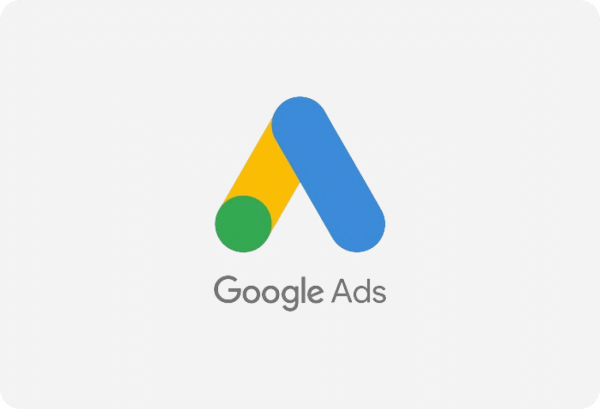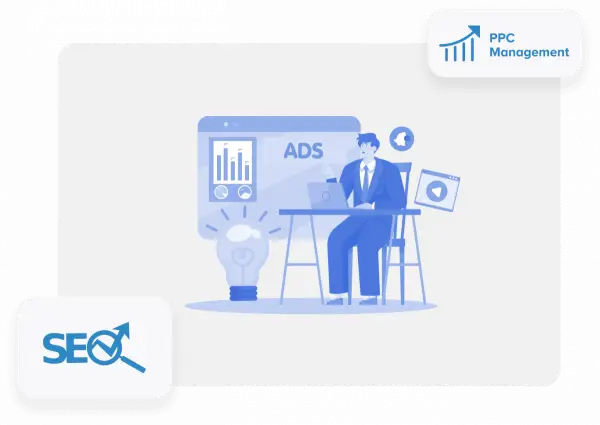Enterprise Brands That Trust Us.






With SEO Brand’s PPC management services, you will increase brand awareness in paid distribution channels. When it comes to creating exposure through paid search advertising, there are a number of different platforms SEO Brand can launch. They include:
- Google AdWords PPC
- National Campaigns
- Localized Campaigns
- Facebook Advertising
- Bing PPC
- International Campaigns
- Contextual Advertising
What is PPC Advertising?
Pay-per-click advertising falls within the digital marketing realm and is a model that allows advertisers the ability to place ads on a platform and pay the host of the platform when their ad is clicked. The goal of this type of advertising is to lead a user to click on an advertiser’s website or app to initialize contact that allows for further interaction, such as purchasing or sharing.
PPC advertising can be managed on multiple platforms, including Facebook, Google, Bing, etc., where each platform has its own distinct processes for measuring and generating clicks.

What is PPC Management?

At the heart of effective PPC marketing lies competent PPC management. PPC management is a careful process that aims to supervise and improve pay-per-click advertising campaigns on search engines, with a primary goal of maximizing ROI and accomplishing business goals.
But why should a business consider hiring a PPC agency? A PPC agency will offer price points and options for every type of business, large or small. Google AdWords represents the major platform for typical paid search, but Bing and contextual search platforms represent opportunities to advertise in a less competitive space and take advantage of traffic from multiple sources. The specialized knowledge of a PPC management consultant can assist you in:

- Proactively tracking, refining, and enhancing your PPC strategies
- Performing competitive analysis and market research
- Crafting persuasive ad copy
- Ensuring accurate conversion tracking
- Conducting comprehensive keyword research
- Managing ad spend and adjusting according to results
PPC campaign management requires significant testing to find your company’s sweet spot and identify which approaches work best for generating conversions. As a Pay-per-click consultant, we make sure to do our due diligence when it comes to researching your industry and identifying the optimal channels for launching campaigns.
The Role of PPC Managers and Consultants
Behind every successful PPC campaign is a skilled PPC management consultant. The role of a PPC manager extends beyond the confines of initiating and refining PPC campaigns, however. They are responsible for managing budget allocations, supervising search platform accounts, and monitoring key performance indicators (KPIs).
- The strategic decisions made by a pay-per-click consultant can be the difference between a successful campaign and a fruitless endeavor. They:
- Adjust performance metrics
- Analyze data
- Identify trends
- Improve PPC ads
- Strategize for paid search
- Manage budgets and ad spend
- Select profitable keywords
- Identify target audiences
- Conduct bid management
What are the benefits of PPC Management Services?

- Immediate lead generation: promote new products and services instantly through ads on search engines, text-based advertising, and other paid distribution channels. There’s no “waiting” period; you can begin right away!
- Dominate the page: running a PPC campaign in conjunction with an organic search strategy will give your brand a presence on both paid and non-paid listings. There’s a potential to show up in multiple places in search results.
- Pay only for clicks: it’s as simple as it sounds – you only pay when someone clicks your advertisement. Unlike traditional advertising, paid advertising allows you to set the budget that you want. Nothing more, nothing less.

- Understand your audience: by testing different paid advertising sources, you will see which keywords, ads, and placements generate the best return on investment. Learn more about your targeted audience’s consumer behavior online and then adapt your strategy accordingly.
- Retain your engagements: PPC management services allow for easier remarketing and remodeling, giving businesses the chance to stay close with already made engagements via website or prior searches.
PPC Management Services: Tools and Platforms Used
PPC advertising is often considered an umbrella term that encapsulates a variety of different tools and platforms to generate clicks. Some of these platforms and applications include:
Types of PPC Ads

Search PPC Ad
The most common type of paid search marketing search ads target individuals who are already seeking your company’s industry or offerings online. Search ads are suitable for short sales cycles or one-time campaign promotions.

Social PPC Ad
With social media dominating today’s online advertising industry, social media advertising is a reliable way to generate traffic on sites like FaceBook, Twitter, YouTube, Instagram, Reddit, LinkedIn, etc. These ads are programmed to appeal to certain hobbies, interests, and other specific factors.

Display PPC Ad
As the name suggests, display ads utilize photos, videos, and texts to capture user attention and convince them to take action through a click, embedded link, or even an interactable image. These are usually targeted to people who visit industry-related sites, often on Google-partnered websites or other search engines.

Remarketing Ad
These ads aim to either remind, or reiterate to users with an already existing engagement with your business. This way, you can more easily convince them to return to your site or app, and hone in on a more direct audience with your ad campaigns.

Google Shopping Ad
Suitable for websites with a large amount of products available, Google shopping ads most often appear above or below the contents of a web page, in either a carousel or slideshow to highlight the product and its prices on Google SERP before the user even clicks.

Amazon PPC Ad
Amazon continues to be a haven for advertisers, and these PPC ads give Amazon sellers an easy way to generate brand awareness, increase traffic, and boost sales via sponsored ads on the platform’s key locations.
Essential Components of Successful PPC Campaigns
Targeting Strategies
Efficient targeting constitutes the initial phase of crafting a triumphant PPC campaign. It involves selecting the appropriate audience segments, keywords, and geographic locations to ensure your ads reach potential customers who are most likely to convert.
The audience segments can be based on characteristics such as:
- age
- gender
- income
- education level
- geographic location
By targeting these segments, advertisers can customize their messaging and offer to specific groups for improved engagement and conversion rates.
Geographic targeting is yet another powerful strategy. Advertisers can use geofencing to target users within a specific radius of their store, define target locations for local campaigns, focus spending in targeted areas using Google Ads location targeting, and include local signifiers in ad content.

Ad Copy Best Practices
The ad copy acts as the digital voice of your brand. It plays a pivotal role in captivating and involving users in PPC campaigns. A well-crafted ad copy can be the difference between a click and a scroll. It’s your first point of interaction with potential customers, and hence, it’s crucial to get it right.
The best practices for ad copy in PPC advertising involve incorporating clear messaging, compelling calls-to-action, and relevant keywords to effectively capture and retain user interest. It’s about creating a narrative that resonates with your target audience, persuading them to click and explore further.

Landing Page Optimization
Once the user clicks on your ad, where do they land? This brings us to another crucial component of a successful PPC campaign – landing page optimization.
Landing page optimization, which can include search engine optimization (SEO), involves:
- Creating user-friendly and visually appealing pages
- Prompting visitors to take desired actions, such as making a purchase or signing up for a newsletter
- Ensuring target keywords are implemented into the page copy
A landing page should incorporate a clear call to action, a user-friendly form, and messaging that closely corresponds with the ad copy shown to the user. Conversion Rate Optimization (CRO) plays a crucial role in the optimization of landing pages as it involves the continuous process of testing and adjusting various elements to identify the most impactful version that enhances the probability of conversions.

How to Choose a PPC Agency
Selecting the right PPC agency or PPC management consultant is a critical decision that can significantly impact your PPC campaign’s success. Several factors need to be considered, including the agency’s technical skills and expertise, fee structure, and communication and reporting practices.

Experience and Expertise
When selecting a PPC management consultant or agency, evaluate their track record and proficiency. An agency or consultant with a proven track record and industry expertise can provide invaluable insights and strategies to drive your PPC campaign’s success.

Pricing Models
Understanding the agency’s pricing models is another crucial factor. Most agencies establish their fees by calculating a percentage of the client’s monthly ad spend, thereby deriving a management fee proportional to the client’s advertising expenditures. Performance-based pricing is another model where the fee is determined by agreed-upon success metrics, usually centered on achieving specific goals.

Communication and Reporting
Effective communication and reporting practices are essential for a successful partnership. Regular communication fosters transparency and facilitates meaningful growth in PPC campaigns. A PPC management consultant is advised to engage in regular communication with their clients, usually on a monthly basis. However, it may be necessary to have additional in-person meetings or frequent check-ins based on the client’s location and the nature of the campaign being conducted. The agency should also provide comprehensive reports to keep the client informed about their PPC campaigns and enable data-driven decisions to enhance performance.
SEO Brand’s PPC Strategy Services
Through extensive research, our PPC management company selects the best collection of keywords for search-based campaigns to maximize exposure and keep bid costs relatively low. Users are segmented based on keywords and geographic location. This may be the most difficult part when developing a Pay Per Click campaign. When we take charge as your pay-per-click consultant, we back up your keyword data with thorough research to ensure success.
Here’s what types of PPC strategy services your company can expect from us::
- SEO Brand creates multiple ad groups for both split testing and optimization purposes. Campaign testing is critical as the immediate feedback allows our team to analyze the strategy and re-adjust based on ad copy, landing pages, and keywords that are most effective at driving traffic and targeting leads.
- Landing pages with a clear call to action increases conversion rates and maximizes your ROI. SEO Brand creates a seamless funnel from the ad itself to the desired result.
- Once your PPC campaign gets going, we provide your business with ongoing monitoring and detailed reports, including key statistics and future recommendations if the campaign needs adjusting. SEO Brand closely analyzes click-through rates and conversion rates and makes adjustments with regard to bid management.

Google Ads Management Services
Supervising a PPC campaign on Google Ads entails a multitude of tasks, from initiating the campaign to its constant optimization for improved performance. It also takes an agency that knows the platform inside and out. Our Google Ads management services are a full-service solution for constructing, executing, and overseeing a Google Ads pay-per-click (PPC) campaign to its fullest potential.
Our Google Ads management services optimize PPC campaigns through the following:
- A thorough examination of Google Analytics and campaign data within the Ads platform
- Strategic adjustments to campaign elements
- Assessment of keywords, ad copy, bid strategies, ad spend, and targeting options to improve performance and ROI

SEO Brand’s Retargeting Strategies
Some visitors might be in a “browse-only” mode and leave your site. In fact, most users are likely to leave a site without completing a purchase. That’s where display advertising and retargeting can prove beneficial marketing tactics.
They not only maximize your online exposure, but they also generate more sales. With the help of SEO Brand’s display advertising and retargeting services, you can re-market to them elsewhere on the web.
Here’s how it works:
- Through marketing efforts, you drive a targeted audience to your website.
- Users browse your website, looking at various products and services.
- Due to circumstances out of your control, they leave your site and begin to surf the web.
- On one of their favorite sites or Facebook, a display ad promotes your website.
- Recalling the brand, users come back to your site to make a purchase, making the satisfying journey from browser to customer.

The Benefits of Retargeting (Remarketing)
Retargeting provides the ultimate opportunity to encourage new users to become customers or promote offers to existing customers with cross-sells and upsells. Pushing products and services has never been easier.
Retargeting can help your business:
- Increase conversion rates: users researching a product are more inclined to shop around. See a measured ROI from generating traffic by bringing them back to your website.
- Fight shopping cart abandonment: users comparing different online retailers are more inclined to abandon shopping carts during the purchasing process. Through retargeting, you can target users based on specific products they have viewed and abandoned. Displaying targeted ads on their favorite sites can encourage them to go back and complete a transaction.
- Increase brand awareness: the more your ads are seen, the more likely your brand is recalled. Even if users are just comparing alternatives or searching for information, increasing the number of times your brand is exposed to a target audience will ultimately lead to sales.
PPC Driven by Multi-Channel Data Insights
Our Pay Per Click management services follow a data-driven model that weaponizes Multi-Channel data insights to find growth for your business. With these insights, we integrate data across SEO and all paid media channels to establish meaningful connections with users that ultimately impact your bottom line.
Get in Touch with an Expert PPC Agency
If you are interested in our PPC management services (or other digital marketing services), contact the experts at SEO Brand. As an award-winning PPC agency, each pay-per-click consultant on our team is more than capable of helping you run a successful ad campaign. Call us today to take advantage of everything we have to offer your business.
